Ditapis dengan
E-book The Heart of Christianity
What is the heart of Christianity? What does it mean to be Christian today? In this book, I describe two quite different answers to this question. The first is an earlier vision of Christianity; the second, an emerging vision. Both are present in the churches of North America today, deeply dividing Christians. We live in a time of conflict and change in the church. I write with both conviction …
- Edisi
- -
- ISBN/ISSN
- -
- Deskripsi Fisik
- 258 hlm
- Judul Seri
- -
- No. Panggil
- 230 BOR t
E-book Automatic Religion : Nearhuman Agents of Brazil and France
Brazil’s most famous outsider artist, Arthur Bispo do Rosário, spent fi ft y years in an asylum on the edge of Rio de Janeiro, diagnosed with schizophrenia. On the walls of his studio- cell as well as on objects therein, he created scores of works, many of them now displayed in museums. When, late in life, he gained public recognition, it caused …
- Edisi
- -
- ISBN/ISSN
- 9780226749860
- Deskripsi Fisik
- 333 hlm
- Judul Seri
- -
- No. Panggil
- 230 JOH a
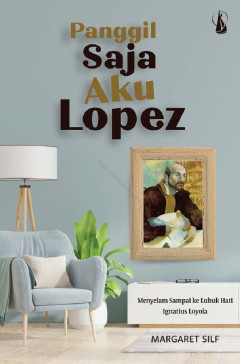
Panggil Saja Aku Lopez: Menyelam Sampai ke Lubuk Hati Ignatius Loyola
Rachel berjumpa dengan Lopez tanpa gagasan apa pun sebelumnya tentang dia. Ia adalah orang asing baginya. Ia bahkan tidak berbagi latar belakang agamanya. Rachel, barangkali, seorang peziarah pascagereja, yang mencari bagi dirinya kebenaran terdalam dan berjuang dengan masalah-masalah hidupnya sendiri. Ia berjumpa dari hati ke hati dengan Lopez, melintasi keterpisahan lima abad sejarah dan keti…
- Edisi
- -
- ISBN/ISSN
- 9789792174762
- Deskripsi Fisik
- 252 hlm, 12,5 X 18,5 cm, ilus.
- Judul Seri
- -
- No. Panggil
- 230.01 SIL p
E-book The Spiritual Exercises of Saint Ignatius
The Spiritual Exercises of St. Ignatius, one of the great masterpieces of the Christian canon, today continues to offer some of the most accessible and insightful guidance for going on retreat -- whether as a part of a group or by oneself. Based on the rich fruit of St. Ignatius' own meditations and practice, this guide for spiritual perfection has been treasured and faithfully used for centuri…
- Edisi
- -
- ISBN/ISSN
- 9780385024365
- Deskripsi Fisik
- 161 halaman, ilus.
- Judul Seri
- -
- No. Panggil
- 230 LOY t
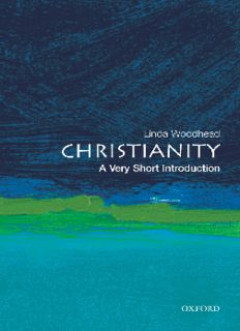
E-book Christianity: A Very Short Introduction
Exploring the cultural and institutional dimensions of Christianity, and tracing its course over two millennia, Linda Woodhead provides a fresh, lively, and candid portrait of Christianity's past and present. Addressing topics including the competition for power between different forms of Christianity, the churches' use of power, and its struggles with modernity, this new edition includes up to…
- Edisi
- -
- ISBN/ISSN
- 9780199687749
- Deskripsi Fisik
- 182 halaman
- Judul Seri
- -
- No. Panggil
- 230 WOO c
E-book A Complex Relation : Reading Anne Conway from a Process Theology Persp…
The seventeenth-century philosopher Anne Conway (1631–1679) has received renewed attention from scholars of various fields during the last three decades. Preeminently, the historian of philosophy Sarah Hutton has contributed import-ant work to this scholarly development by publishing a re-edited version of the Viscountess’ correspondence, published in 1992, …
- Edisi
- -
- ISBN/ISSN
- 9783402137437
- Deskripsi Fisik
- 269 hlm
- Judul Seri
- -
- No. Panggil
- 230 FEL a
E-book Religiousness in the Late Middle Ages : Christianity and Traditional C…
Let us retreat for a brief moment to the era that preceded the Late Middle Ages. In so doing, we might notice that some historians who have researched the Christianisation of Central and Eastern European societies as a continuous pro-cess, unfolding over centuries, estimate that pagan belief systems expired in the twelfth century, at the latest. The eminent Polish medievalist Henry…
- Edisi
- -
- ISBN/ISSN
- 9783653068702
- Deskripsi Fisik
- 176 hlm
- Judul Seri
- -
- No. Panggil
- 230 BYL r
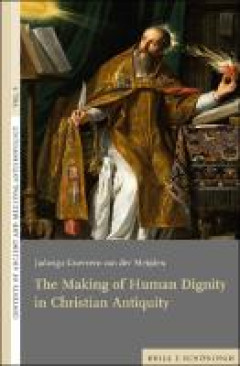
E-book The Making of Human Dignity in Christian Antiquity
The book examines the late ancient history of one pivotal concept of contemporary culture, that of human dignity, with the view to identifying the moment in history when European culture worked out a systematic category for human axiological status. Whereas some studies concentrate on the notion of dignity in the Renaissance, suggesting that the earlier Christian thought emphasized human insign…
- Edisi
- -
- ISBN/ISSN
- 9783657796700
- Deskripsi Fisik
- 308 halaman, ilus.
- Judul Seri
- -
- No. Panggil
- 230.01 MEI t

E-book God Loves You: He Always Has--He Always Will
That God loves us is the most profound truth in the universe. Experiencing this love has the potential to answer every question, solve every problem, and satisfy the deepest yearnings of the heart. So why are many people who believe this still unable to fully utilize the power of God's love in their personal lives? In this probing book, Dr. David Jeremiah reveals that not fully understanding…
- Edisi
- -
- ISBN/ISSN
- 9780446565974
- Deskripsi Fisik
- 240 halaman
- Judul Seri
- -
- No. Panggil
- 230 JER g
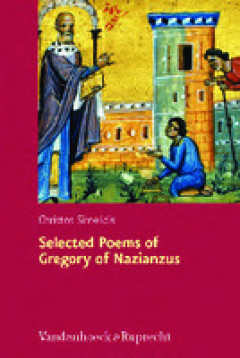
E-book Selected Poems of Gregory of Nazianzus: I.2.17; II.1.10, 19, 32: A Cri…
St. Gregory of Nazianzus' (ca. AD 330-390) classicizing Christian verse is the earliest Greek verse of its kind that survives in any great quantity. This is a critical edition, with introduction and commentary, of four poems (I.2.17; II.1.10, 19, 32). The commentary is primarily linguistic, but attention is paid to historical and theological matters. The poems' fate in Byzantium is also examine…
- Edisi
- -
- ISBN/ISSN
- 9783666252877
- Deskripsi Fisik
- 289 halaman
- Judul Seri
- -
- No. Panggil
- 246 SIM s

E-book Eyewitness Books: Christianity
An introduction to Christian beliefs and culture discusses the life and teachings of Jesus, the Gospels, divisions and sects within Christianity, and Christian life.
- Edisi
- -
- ISBN/ISSN
- 9781405316033
- Deskripsi Fisik
- 70 halaman, ilus.
- Judul Seri
- -
- No. Panggil
- 230 WIL e

E-book The Bible Dilemma: Historical contradictions, misquoted statements, fa…
The Bible Dilemma is a compilation of Bible verses that shows the following: 1. Historical contradictions, inconsistencies and discrepancies within the Bible and with recorded history 2. Failed promises and prophecies 3. Misquoted statements within the Bible 4. Borrowed and alluded statements within the Bible 5. Borrowed and alluded statements from non-biblical sources 6. Stories and…
- Edisi
- -
- ISBN/ISSN
- 9781608440214
- Deskripsi Fisik
- 526 halaman
- Judul Seri
- -
- No. Panggil
- 230 GUT t
E-book How to Read the Bible: History, Prophecy, Literature--Why Modern Reade…
McKenzie argues that to comprehend the Bible we must grasp the intentions of the biblical authors themselves--what sort of texts they thought they were writing and how they would have been understood by their intended audience. In short, we must recognize the genres to which these texts belong. McKenzie examines several genres that are typically misunderstood, offering careful readings of speci…
- Edisi
- -
- ISBN/ISSN
- 9780195161496
- Deskripsi Fisik
- 221 halaman.
- Judul Seri
- -
- No. Panggil
- 230 MCK h
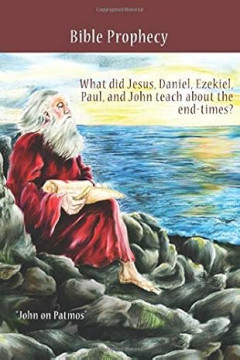
E-book Bible Prophecy: What did Jesus, Daniel, Ezekiel, Paul, and John Teach …
Keep Watch! That simple warning summaries Jesus’ teaching about the end-times. That warning accompanied parables that explained its significance. One such story concluded that if the owner of the house had known when the thief was coming, he would have kept watch and not been robbed. (Matthew 24:43) There are practical aspects of keeping watch. Epic world events have already placed the world …
- Edisi
- -
- ISBN/ISSN
- 9781980304517
- Deskripsi Fisik
- 118 halaman
- Judul Seri
- -
- No. Panggil
- 230 SHO b
E-book Science and Faith in Dialogue
his chapter explores some of the underlying epistemological assumptions and points of departure underpinning much of the recent science-faith dialogue, which ranges from coherent, enriching, concordant views on the relation between faith and science to disharmonious debate and conflict. Discordant dialogue and unscientific conjecture, often misrepres…
- Edisi
- -
- ISBN/ISSN
- 9781779952066
- Deskripsi Fisik
- 404 hlm
- Judul Seri
- -
- No. Panggil
- 230 EBE s

E-book The Three Heavens: Angels, Demons and What Lies Ahead
John Hagee's breathtaking biblical tour of the three heavens takes you inside the timeless clash between the Kingdom of Light and the Kingdom of Darkness and explains why that battle makes all the difference in this world and the world to come. In The Three Heavens, Hagee uses the Word of God, science, and incredible true stories of the supernatural to explore the First Heaven. He then expos…
- Edisi
- -
- ISBN/ISSN
- 9781617953699
- Deskripsi Fisik
- 228 halaman
- Judul Seri
- -
- No. Panggil
- 230 HAG t
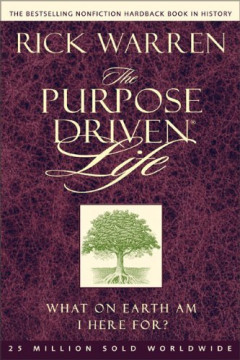
E-book The Purpose Driven Life: What on Earth Am I Here for?
The Purpose Driven Life will help you understand why you are alive and reveal God's amazing plan for you both here and now, and for eternity. Rick Warren will guide you through a personal forty-day spiritual journey that will transform your answer to life's most important question: What on earth am I here for? Knowing God's purpose for creating you will reduce your stress, focus your energy, si…
- Edisi
- -
- ISBN/ISSN
- 0310254825
- Deskripsi Fisik
- 340 halaman
- Judul Seri
- -
- No. Panggil
- 261.515 WAR t
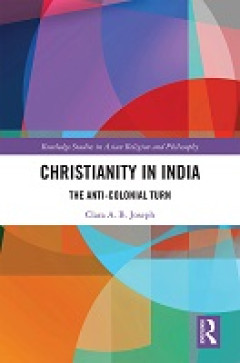
E-Book Christianity in India: The Anti-Colonial Turn
By studying the history and sources of the Thomas Christians of India, a community of pre-colonial Christian heritage, this book revisits the assumption that Christianity is Western and colonial and that Christians in the non-West are products of colonial and post-colonial missionaries. Christians in the East have had a difficult time getting heard—let alone understood as anti-colonial. This …
- Edisi
- -
- ISBN/ISSN
- 9781351123839
- Deskripsi Fisik
- 189 halaman
- Judul Seri
- -
- No. Panggil
- 230 JOS c
E-book Take Your Church 's Pulse : 10 Vital Signs of a Healthy Church
The full scope of the New Testament highlights the reality that God hasn’t called and redeemed his people simply for their own benefit. He has chosen the church to change the world. Through the church, as believers gather in a community of faith, others get a glimpse of the way life is supposed to be. It is visible in the way husbands and wives treat each other, the way children are raised, a…
- Edisi
- -
- ISBN/ISSN
- 7084141050
- Deskripsi Fisik
- 221 hlm
- Judul Seri
- -
- No. Panggil
- 230 KOS t
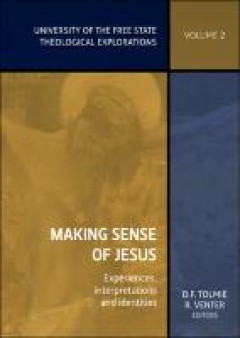
E-Book Making sense of Jesus: Experiences, interpretations and identities
Making sense of Jesus is comprised of twelve chapters of a Christological nature, which are the result of a multidisciplinary theological research project. The aim of this book is to ascertain how, in the current cultural situation, an encounter with Jesus is determined by specific historical and personal conditions, and what the consequences of such an encounter may be.
- Edisi
- -
- ISBN/ISSN
- 9781928424079
- Deskripsi Fisik
- 276 halaman
- Judul Seri
- -
- No. Panggil
- 230 TOL m
Leading Things You Didn't Start : Winning Big When You Inherit People, Places…
It's human nature to be fascinated by the new. Yet most leaders spend their days navigating preestablished cultures, processes, teams, and goals. They aren't paid to create things from scratch but instead are changed with overseeing, maintaining, and often rescuing what others started. Unfortunately, this isn't what most of us were trained to do, either in business school or in the places we fi…
- Edisi
- -
- ISBN/ISSN
- 9780525654049
- Deskripsi Fisik
- 14.5 x 22 cm; 191 hlm
- Judul Seri
- -
- No. Panggil
- 261.515 REA l
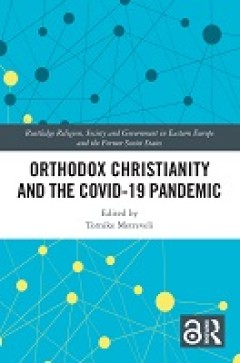
E-Book Orthodox Christianity and the COVID-19 Pandemic
This book probes into the dynamics between Orthodox Christianity and the COVID-19 pandemic, unraveling a profound transformation at institutional and grassroots levels. Employing a multidisciplinary approach, and drawing upon varied data sources, including surveys, digital ethnography, and process tracing, it presents unprecedented insights into church-state relations, religious practices, and …
- Edisi
- -
- ISBN/ISSN
- 9781003372776
- Deskripsi Fisik
- 228 halaman
- Judul Seri
- -
- No. Panggil
- 230 MET o
E-book Deep Incarnation : God's Redemptive Suffering with Creatures
Since the council, the Christian church has only grown in its appreciation for the value of diverse, deeply inculturated expressions of the one faith. These expressions might appear in the form of local liturgies and spiritualities, or in distinctive religious customs and popular devotions. Among these diverse expressions, we must include theological articulations of the faith that arise as Chr…
- Edisi
- -
- ISBN/ISSN
- 978160833794
- Deskripsi Fisik
- 161 hlm
- Judul Seri
- -
- No. Panggil
- 230 EDW d

E-Book It's Okay Not to be Okay
This book is dedicated with love and admiration to every weary soul who falls down and gets back up, over and over again. It’s easy to fall; it takes courage to rise up and take the next step.
- Edisi
- -
- ISBN/ISSN
- 9780801078002
- Deskripsi Fisik
- 34 hlm
- Judul Seri
- -
- No. Panggil
- 248.8 WAL i
E-book Contextual Theology : Skills and Practices of Liberating Faith
he notion of “contextual theology” has a long history, beginning with its gradual introduction in the “Fund for Theological Education”. The term gained prominence through both the World Council of Churches and the Lausanne Movement adopting it in the 1970s. Theologians in Africa and Asia were already interested in how cultural contexts affected the interpre-tation o…
- Edisi
- -
- ISBN/ISSN
- 9780429348006
- Deskripsi Fisik
- 259 hlm
- Judul Seri
- -
- No. Panggil
- 230 BER c
E-book World Christianity : Methodological Considerations
The brief literature review above demonstrates the necessity of a compre-hensive inquiry into the methodological ramifications of the “world-Christian turn”. This volume gives methodology the center stage and aspires to spark the debate on methodology. To that end, we as editors have purposely invited a diverse group of contributors from a variety of academic backgrounds (anthr…
- Edisi
- -
- ISBN/ISSN
- 9789004444867
- Deskripsi Fisik
- 328 hlm
- Judul Seri
- -
- No. Panggil
- 230 FRE w
E-book The Spiritual Laws
I have always asked myself many questions, very profound questions. The kind of questions that are called existential questions. I have always wanted to know the reason for my life, the reason for all of our lives. Who am I? Why do I exist? Why do others exist? What are we doing here? Have we come here for anything in particular? Why are we born, why do we die? Where do we come from and where a…
- Edisi
- -
- ISBN/ISSN
- -
- Deskripsi Fisik
- 243 hlm
- Judul Seri
- -
- No. Panggil
- 230 GUI t
E-book Majority World Perspectives on Christian Mission
In a presentation to the Lausanne Younger Leaders’ gathering in Indonesia during August 2016 on the state of the church, Jason Mandryk, of Operation World, asserted that bythe year 2020, 80% of the world’s Christians would come from what is known as the Global South (Africa, Asia and Latin America). In the year 1900, there were reportedly around 9 million Christians …
- Edisi
- -
- ISBN/ISSN
- 9781776402342
- Deskripsi Fisik
- 258 hlm
- Judul Seri
- -
- No. Panggil
- 230 BOT m
E-book Sacred Views of Saint Francis : The Sacro Monte di Orta
rancis had a vital role to play at this mo-ment in the history of the Italian peninsula, and in no place is the case for his relevance made more beautifully, completely and com-prehensively than the Sacro Monte di Orta. Riding a wave of enthusiasm created by the success of the Sacro Monte di Varallo, forty miles to the west, this Sacro Monte is both spectacle and hagiography…
- Edisi
- -
- ISBN/ISSN
- 9781950192786
- Deskripsi Fisik
- 209 hlm
- Judul Seri
- -
- No. Panggil
- 230 CYN s
E-book True Christianity
Both the general purpose of the venerable Johann Arndt in writing his “TRUE CHRISTIANITY,” and also his own character and spirit, will be best exhibited by submitting to the reader a statement referring to his personal history. He was born, December 27th, 1555, in Ballenstädt, a town in the Duchy of Anhalt, where his father, Rev. Jacob Arndt, long labored as the chaplain of Duke Wolfgang, …
- Edisi
- -
- ISBN/ISSN
- -
- Deskripsi Fisik
- 920 hlm
- Judul Seri
- -
- No. Panggil
- 230 ARN t
 Karya Umum
Karya Umum  Filsafat
Filsafat  Agama
Agama  Ilmu-ilmu Sosial
Ilmu-ilmu Sosial  Bahasa
Bahasa  Ilmu-ilmu Murni
Ilmu-ilmu Murni  Ilmu-ilmu Terapan
Ilmu-ilmu Terapan  Kesenian, Hiburan, dan Olahraga
Kesenian, Hiburan, dan Olahraga  Kesusastraan
Kesusastraan  Geografi dan Sejarah
Geografi dan Sejarah